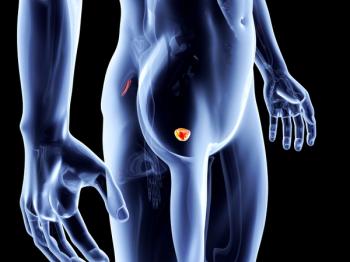
ESMO 2016: Early Results for Pembrolizumab Against Metastatic Enzalutamide-Refractory Prostate Cancer
Pembrolizumab showed clinical activity against some cases of enzalutamide-refractory metastatic castration-resistant prostate cancer.
Pembrolizumab (Keytruda) showed clinical activity against some cases of enzalutamide (Xtandi)-refractory metastatic castration-resistant prostate cancer (mCRPC), according to preliminary findings from a small phase II
The findings are the first evidence of significant clinical activity against mCRPC for programmed cell death protein 1 (PD-1) immune checkpoint blockade, they researchers wrote.
“Early results demonstrate reproducible, profound and – to date – durable responses to PD-1 inhibition with enzalutamide in men with mCRPC,” wrote lead study author Julie N. Graff, MD, of the Knight Cancer Institute, Oregon Health & Science University in Portland, and coauthors.
The potential of immunotherapies like immune checkpoint blockade in treating prostate cancer has been unclear, but increased PD ligand 1 (PD-L1) expression is associated with tumor resistance to enzalutamide, the researchers noted. Androgen inhibition also affects immune response to prostate tumors.
They therefore sought to determine whether or not adding a PD-1 inhibitor, pembrolizumab, to enzalutamide yields antitumor activity.
“We treated men with mCRPC progressing on the androgen receptor antagonist enzalutamide on a phase II study of pembrolizumab 200 mg IV every 3 weeks for 4 doses with continued enzalutamide,” they reported. Patients with prior mCRPC-directed chemotherapy were excluded from the study.
As of July 22, 2016, at a median follow-up of 18 weeks, 20 patients had completed pembrolizumab, of whom four (20%) achieved a confirmed PSA reduction of 50% or more, serum PSA < 0.1 ng/ml, and had remained progression-free after 16 to 61 weeks. Seven other patients have had stable disease (SD) for 9 to 50 weeks. Eight patients experienced disease progression.
“Two of the responders were able to discontinue opioid analgesic after reporting resolution of cancer-related pain,” the authors noted.
Five patients (25%) experienced significant immune-related adverse events. (Two patients developed grade 3 colitis; one patient each experienced grade 2 myositis, grade 2 hypothyroidism, and grade 3 hypothyroidism.)
Immunohistochemical analysis from pretreatment biopsies were possible for two responders, revealing CD3+, CD8+, and CD163+ leukocyte infiltrates and PD-L1 expression.
The study was funded by Merck Sharp & Dohme Corporation.
Newsletter
Stay up to date on recent advances in the multidisciplinary approach to cancer.














































